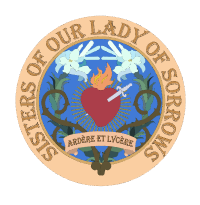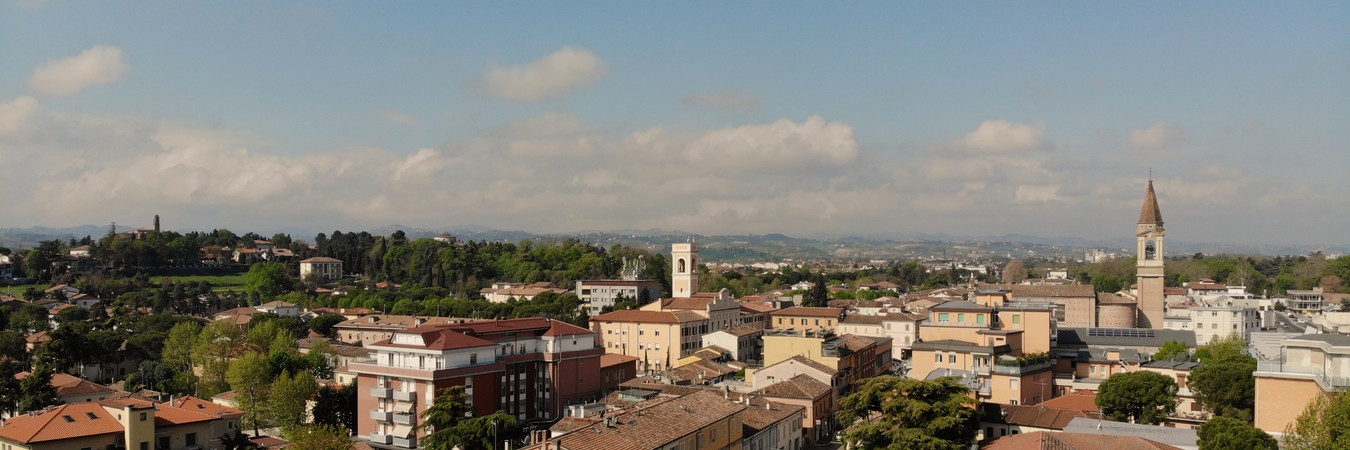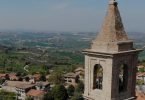Her Father – Giambattista Renzi
Giambattista, Elisabetta’s father, was born in Saludecio to a prestigious family on May 20, 1753, and was baptized on May 22. He was a man of faith and piety. As an appraiser, he would look after his property and the property of the Monastery of Saints Bernard and Clare in Mondaino. From some of his letters, we learn that in 1807, in the time period when Italy was a Kingdom, he was temporary mayor of the district of Saludecio. His most favorable activity was that of being charitable to the needy.
Giambattista Renzi died suddenly on November 15, 1824, after becoming ill, at the age of 71; he was buried on November 17 in Mondaino in the tomb of the Confraternity of the Holy Sacrament, of which he had been the Prior [leader] since 1820..
Elisabetta was very close to her father, and she shared much about her inner journey with him.
Her Mother – Vittoria Boni
Vittoria Boni was baptized in Urbino on the June 13, 1753, but we don’t know the date of her birth; she was the youngest of twelve children, of a family of nobility. At the age of five, she lost her father.
Her marriage to Giambattista Renzi was celebrated on April 23, 1784, in the church of Saints Philip and James of Forcuini, a village just a few kilometers from Urbino. Officiating was Vittoria’s brother, Fr. Giuseppe. Seven children were born to the couple: the first four in Saludecio (Giancarlo 02/15/1785-11/26/1860; Elisabetta 11/19/1786-08/14/1859; two others died shortly after their birth); the other three in Mondaino, among whom Dorotea (02/06/1793-07/04/1813) had the longest life and died at the age of twenty.
Vittoria Boni died on January 26, 1838, at the age of 85. She was buried in the tomb in front of the altar of the chapel of the Virgin Mary of the Rosary in Belvedere Fogliense.
A few days after the burial, Elisabetta replied to the Bishop: “I thank Your Excellency for the condolences you sent to me after the death of my dear mother, and most of all, for your promises to pray for her. The life that she lived and her acceptance of death, together with what she did for the holy Church, makes me hope that she is already enjoying the eternal repose, and this gives some comfort to my afflicted hear”. (02/02/1838)
Her Brother Giancarlo
Giancarlo inherited his parents’ profound Christian spirit; he was a member of the Sodality of the Holy Crucifix, serving as its Prior from its foundation in 1842. He was the mayor of the town of Mondaino. He married Giovanna Venturi of Mondaino, twenty-eight years younger than him, and they had eleven children.
The descendants of the Renzi family say that Giancarlo had never decided to get married, because he was busy with hunting and his occupation. Finally, when he met Giovanna, he made up his mind to marry, but being the way he was, the morning of the day in which the wedding was to be celebrated, he went hunting and returned just before the beginning of the celebration.
Giancarlo’s great faith is also revealed in a prayer he composed.
“Eternal Father, I offer you the Body, Blood, Soul, and Divinity of your Most Holy Son, who, as a Victim of love, sacrifices Himself for me on this altar:
and this is in reparation for my sins,
in prayer for the Holy Souls in Purgatory, especially those for whom I am obliged to pray according to the order of Your infinite Wisdom;
in gratitude for the benefits You have bestowed upon me;
and finally in thanksgiving for the privileges You granted to Mary Most Holy in this world and when she was assumed into heaven.
I beg you, most worthy Mother, to present this offering with your most pure hands to the Holy Trinity: Father, Son and Holy Spirit.
And by virtue of this grace, may I live as a good Christian,
and then enjoy the company of the Angels and Saints in Paradise”.
On June 30, 1905, on the occasion of his visit to Mother Giuseppina in Rimini, Cardinal Domenico Svampa, Archbishop of Bologna, granted “one hundred days of indulgence to those who devoutly recite this prayer”.
Her niece Giuseppina
The second born, Maria Giuseppina went to the Conservatory in Coriano at the age of nine as a boarding student. On May 13, 1856, at the age of nineteen, she received the religious habit, and until the death of Mother Elisabetta, was her secretary. She would become the fourth Superior General of the Institute founded by her Aunt Elisabetta and would direct it for thirty-five years.
When Giuseppina decided to become a religious sister, her mother Giovanna called her back home to test her vocation, and she stayed there for 17 days in the month of May 1855.
We find evidence of this in two very significant letters:
“If you were alone, I would be the first to fear, since of ourselves we have nothing but weakness, powerlessness, and misery, but our Lord is with you from morning to evening and from evening to morning!
Are you suffering? It is the divine hand that gives you His cross. When you work He is there to bear half of your pain; when you cry, He comes closer to you to dry your tears; when you pray, it is He who prays in you. But it is not necessary for you to be aware of this. Be happy because you know that the good Lord loves you, because you know that we have heaven before us, and because – despite our weaknesses, our miseries, and our mountains of defects – we progress towards God every day, and we may advance the most on days when we are least aware of it. Giuseppina, your heart must be a channel; no created thing can remain there. All those who enter, even your father and mother, have to pass through the heart of Jesus. The more God enriches your heart, the more sensitive He makes it, but also the more He demands that it be absolutely detached for love of Him. How beautiful it is to suffer and how happy are the victims!” . (Biographical Sketch p. 27)
Her father writes:
“My dearest daughter,
The disgusting scene that happened there, as my sister told me, caused me great pain. I did not refrain from talking with your mother about this and she was sorry of the way she came across, but her spirit is not at peace if she does not test your firm and well-discerned resolve [to enter religious life]. She was advised to do this experiment by many people, among them, the Abbess of the monastery and several sisters. God’s plans are inscrutable. Who knows that this little obstacle aimed at weakening your resolve may be permitted by the Lord for a greater good for you? I don’t know what to add. Pray and ask for prayers so that the Giver of all grace may assist you and give serenity to your spirit for any controversy, even little, that you had to endure.
Fiat voluntas Dei [May the will of God be done].
May the Lord, Holy Mary and all the Saints bless you.
Your very affectionate Father”.
May 13, 1855
In the words of Sister Catherine Giovannini, we can summarize Elisabetta Renzi’s time spent in the family:
“Born of very devout parents and protected by the love of God, Elisabetta passed her childhood in great simplicity and innocence of manners. Here we see in Elisabetta an instance of what we sometimes observe: that even though children cannot receive the privilege of exemption from original sin from their parents, however pure and Christian their lives, still by following their example the children may grow up in innocence, almost as though it were a second nature.
God wants the first fruits of all that He has created, and Elisabetta’s mother, Contessa Vittoria Boni Renzi, in love and devotion to God, offered to Him the first stirrings of her child’s life, the first reaching out of her mind, and the first words that she spoke. In turn, Elisabetta was so devoted to her mother that she would often say: ‘A child cannot look at its mother without tenderness, without wanting to become better.’ She was often heard to thank our Lord that she had been able to grow in innocence and the practice of solid virtue so easily through the constant good example of her parents.
When Elisabetta was growing up she was greatly loved in her home, and admired by those who knew her. She was a serious child, little interested in the play and games of most children her age. She was modest, and seemed drawn to piety; she had a natural kindness and gentleness of character. She readily obeyed those she should, and every day pleased those around her more. Above all, she was loved by the Lord, who delights in innocent hearts”. (Biographical Sketch p. 5-6)







